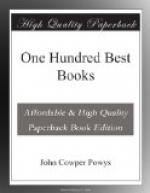62. EMILY BRONTE. WUETHERING HEIGHTS.
Of all the books of all the Brontes, this one is the supreme masterpiece. Charlotte has genius and imagination. She has passion too. But there is a certain demonic violence about Emily which carries her work into a region of high and desperate beauty forbidden to the gentler spirit of her sister. The love of Heathcliff and Catherine breaks the bonds of ordinary sensual or sentimental relationship and hurls itself into that darker, stranger, more unearthly air, wherein one hears the voices of the great lovers; and where Sappho and Michaelangelo and Swift and Shelley and Nietzsche gasp forth their imprecations and their terrible ecstasies. Crude and rough and jagged and pitiless, the style of this astounding book seems to rend and tear, like a broken saw, at the very roots of existence. In some curious way, as in Balzac and Dostoievsky, emotions and situations which have the tone and mood of quite gross melodrama are so driven inwards by sheer diabolical intensity, that they touch the granite substratum of what is eternal in human passion. The smell of rain-drenched moors, the crying of the wind in the Scotch firs, the long lines of black rooks drifting across the twilight,—these things become, in the savage style of this extraordinary girl, the very symbols and tokens of the power that rends her spirit.
63. GEORGE MEREDITH. HARRY RICHMOND.
“Harry Richmond” is at once the least Meredithian and the best of all Meredith’s books. Meredith, though to a much less degree than George Eliot, is one of those pseudo-philosophic, pseudo-ethical writers, who influence a generation or two and then stem to become antiquated and faded.
It is when he is least philosophical and least moralistic—as in the superbly imaginative figure of Richmond Roy—that he is at his greatest. There is, throughout his work, an unpleasing strain, like the vibration of a rope drawn out too tight,—a strain and a tug of intellectual intensity, that is not fulfilled by any corresponding intellectual wisdom. His descriptions of nature, in his poems, as well as in his prose works, have an original vigor and a pungent tang of their own; but the twisted violence of their introduction, full of queer jolts and jerks, prevents their impressing one with any sense of calm or finality. They are too aphoristic, these passages. They are too clever. They smell too much of the lamp. The same fault may be remarked in the rounding off of the Meredithian plots where one is so seldom conscious of the presence of the “inevitable” and so teased by the “obstinate questionings” of purely mental problems.
Reading Henry James one feels like a wisp of straw floating down a wide smooth river; reading Meredith one is flicked and flapped and beaten, as if beneath a hand with a flail.
64. HENRY JAMES. THE AMBASSADORS. THE TRAGIC MUSE. THE SOFT SIDE. THE BETTER SORT. THE WINGS OF THE DOVE. THE GOLDEN BOWL.




